The Coding Interview Bootcamp: Algorithms + Data Structures Uploaded
3 Calendar month Coding Interview Preparation Bootcamp
The three-month Cocky-Study Roadmap to Success at Software Applied science Interviews
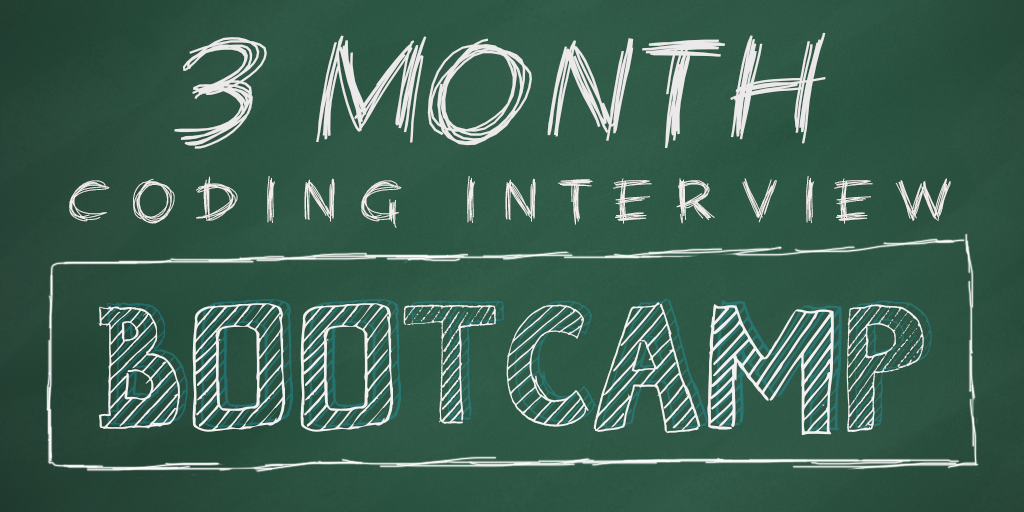
(Some background: I've interviewed hundreds of candidates for software engineering jobs at Facebook and Microsoft. I've likewise failed several coding interviews myself when I wasn't prepared.
I originally started writing this equally an answer to a Quora question about the roadmap for software engineering interviews. Eventually, the answer became so long that I thought it warranted a blog post of its ain.)
Iii months — Actually?
Let's become this out of the style. People ask me a lot: what'due south a reasonable timeframe to crack the coding interviews if y'all're starting from scratch? (i.e., you haven't interviewed in the past several years.)
I would say that three months is a reasonable timeframe. Yeah, really, three months. And barring that, at the very to the lowest degree dedicate four–half-dozen weeks if you lot oasis't interviewed in a while. You tin probably get abroad with less than that if you have interviewed in the terminal 12 months or and so.
Now for the meat. Below are the five main sections that software engineering interviews at "Big Tech" companies like Facebook, Google, Microsoft, etc. will consist of:
- Coding Interviews (focusing on problem-solving, data structures and algorithms).
- Bone and Concurrency Concepts
- Organization Design Interviews.
- Object-Oriented Blueprint Interviews
- Cultural fit interviews
Similar whatever other long-term goal that requires consequent work (such every bit getting ready to run a marathon), post-obit some kind of structure is crucial, as it will encourage you lot to stay on track on days that your motivation might be waning.
To aid with that, I've created a 12-week preparation program that you lot can follow to prepare for your next coding interview. If you follow the program over these 12 weeks, you'll cover all of the topics mentioned above in a structured way. Let'south get started.
Week 0 — What Programming language should y'all use?
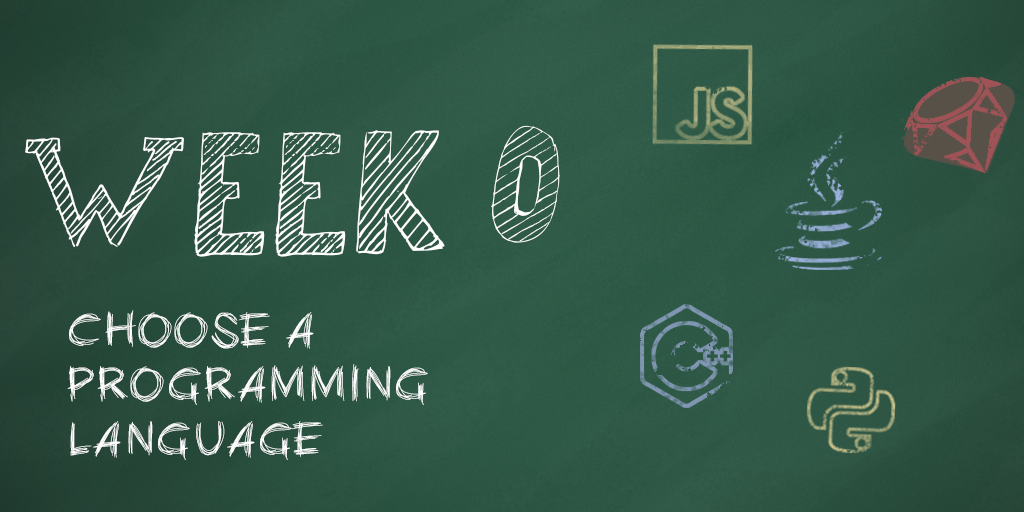
Pick a programming linguistic communication then stick with it. I'm often asked: what if I know more than one? Would, for example, Python be better than Java?
The answer, of course, is that the all-time programming language for your coding interviews is the language that y'all're most comfortable with. About companies/interviewers don't intendance equally long every bit yous tin can show proficiency in any i mainstream programming language.
In some of the worst cases, I've seen people deciding to "switch" to a different programming language in the middle of the interview. That's a big turn-off and a waste matter of fourth dimension. Don't practice that. Pick i early on, and stick to it throughout.
Calendar week 1 — Brush up on the basics of your favorite Programming language
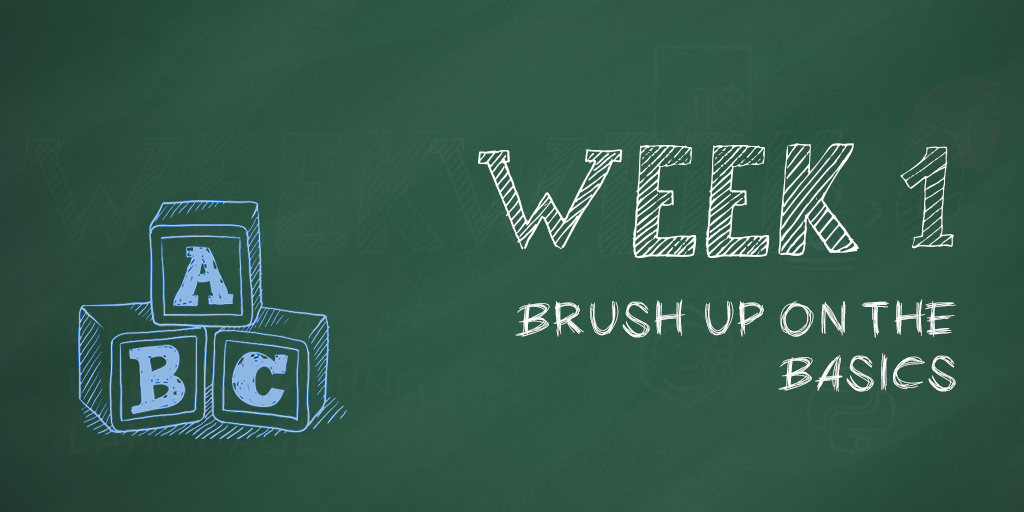
Brush up on your called programming linguistic communication. There are going to exist a lot of things that you've forgotten when y'all have been coding for your day job even using your preferred language. I've seen people struggling to remember things similar:
- How to read/write from/to files
- How to read input from the console
- How to split strings
- Is string length a role or a property (respond: it doesn't matter, but still reflects poorly on y'all)
- How to declare and use 2D arrays
- In C/C++, how to handle null-terminated strings
Once, I saw a candidate get dislocated and not exist able to recall how to figure out if a number was positive or negative. (I'm sure they knew it — they just had a brain freeze).
The time and mental energy that y'all spend on trying to think the nuances of your called programming language would be much better spent on really solving the problem and exhibiting your problem-solving skills. That's what interviewers want to see.
Some companies, like Lyft and Salesforce, require you to solve problems on a laptop. Y'all are expected to write consummate programs that pass given test cases. In these cases, yous might have to:
- Procedure command line arguments
- Parse CSV or text files
Of form, you could but Google those, but that would be fourth dimension spent on trivial tasks that are necessary but don't help yous stand out.
Almost other companies, including Amazon and Google among countless others, will crave yous to solve problems on a white board. This is a very dissimilar experience, requiring some dissimilar skills than coding in an IDE. Now is the time to start practicing actually writing out code (while talking through your idea process) to flex those muscle.
Weeks 2 & iii — Information Structures and Algorithms

Start revising Computer science concepts like Data Structures and Algorithms. Y'all know, those concepts that you once studied in your undergrad and take never looked at since — they're actually quite useful in coding interviews. Hither are some relevant resources:
- For Python, expect at Data Structures in Python for Coding Interviews
- For Java, look at Data Structures in Coffee for Coding Interviews
- For JavaScript, look at Data Structures in JavaScript for Coding Interviews
- For C++, cheque out Data Structures in C++ for Coding Interviews, likewise as Algorithms in C++ for Coding Interviews.
- For Algorithms in various Coding Languages, check out Algorithms and Complication Analysis: An interview refresher
- For Large O notation and complexity analysis, look at Large O for Coding Interviews and Beyond. You lot can likewise cheque out this mail service titled "The insider's guide to algorithm interview questions" which gives you a detailed await at complexity analysis and how to work with it.
Remember to revise topics like:
- Complexity Analysis (a.k.a BigO)
- Arrays
- Stacks
- Queues
- Linked Listing
- Copse
- Tries (They are effectively trees, simply it's nonetheless skilful to call them out separately).
- Graphs (BFS and DFS)
- Hash Tables
- Heaps
- Sorting
- Searching
Weeks 4 & 5 — Practice elementary Data Structure and Algorithmic challenges

As you are familiarizing (or re-familiarizing) yourself with data structures, start practicing relatively simple coding problems associated with these data structures and algorithms.
These questions are typically not asked in interviews at big tech companies. Even if they are, they're usually used as buzz-fizz type warm-up bug. Such questions are also common during phone interviews. Nevertheless, practicing these coding interview questions will help you internalize the data structures and help you tackle the harder questions which you'll be practicing a few weeks from at present.
Castor up your array skills with questions like:
- Remove Even Integers from Assortment
- Merge 2 Sorted Arrays
- Starting time Not-Repeating Integer in an Assortment
- Notice Second Maximum Value in an Array
Brush upward your Linked List concepts with questions like:
- Find Length of Linked List
- Search in Singly Linked List
- Reverse a Linked Listing
- Find Center Value of Linked List
Brush up your Stack/Queue skills with questions similar:
- Sort values in Stack
- Create Stack where min() returns minimum value in O(1)
- Implement 2 Stacks using one Assortment
Exercise Tree Problems like:
- Detect minimum value in Binary Search Tree
- Find Height of Binary Tree
- Detect kth maximum value in Binary Search Tree
Practice Graph Issues:
- Implement Breadth Start Search
- Implement Depth First Search
- Detect cycle in Graph
Do bones Trie Problems:
- Total number of words in Trie
- Find all words stored in Trie
Practice basic Heap problems:
- Discover k smallest elements in a list
- Find k largest elements in an assortment
Weeks 6, 7, viii — Practice more complex coding interview problems
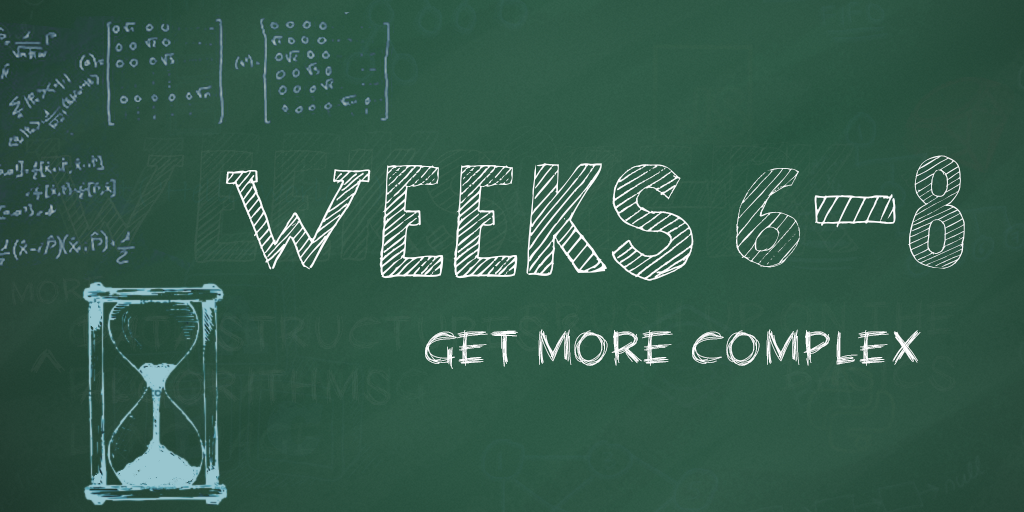
Now that you've been practicing more than straightforward issues for a couple of weeks, it's time to get real and start practicing harder questions that are more than likely to be asked during coding interviews.
For practice and automated challenges forth with interactive solutions, look at Grokking the Coding Interview
- .
Here are some guidelines to keep in mind every bit yous solve these problems:
- Now is the time to showtime timing yourself. Ideally, y'all shouldn't spend more than than twenty–30 minutes solving any given problem. (This probably won't be possible for all questions right away.)
- Don't exist discouraged if you are non able to solve a problem within the allocated time. Solve information technology even if takes you a couple of hours, without looking at the solution. This will assistance you build the confidence that you tin solve it and so you can focus on solving them faster subsequently.
- Kickoff thinking almost the Runtime and Memory complication of each solution. You will take to clear the complexities in the bodily interview clearly, and so it'due south better to start now.
Here are some sample problems to consider:
- Implement Binary Search
- Find the Intersection point of two linked lists
- Reverse words in a judgement
- Bank check if ii binary trees are identical
- Clone (deep re-create) a directed graph
- Detect solutions to a Bungle game
- Determine if there are any three integers in an array that sum equal to the given value.
You will have to spend 2–3 weeks here. Don't worry if you hit roadblocks and go stuck often — you will go the hang of it afterwards a while. Trust me, questions that look impossible in the first few days start to seem piece of cake later y'all've had do.
Weeks 9 & x — Organisation Design Interviews

System design interviews are now an integral part of the software engineering interview process — peculiarly if y'all are applying for a senior part. These interviews have a significant bear upon on your "hiring level."
Learn distributed systems concepts like Cap Theorem, Consistency, Partitioning, Load-Balancing etc.
Await at the form Grokking the System Design Interview for more design interview practice.
Every bit part of your System Design Interviews, you are asked to design a "web-scale" service. Interviewers are interested in evaluating your ability to describe the unlike parts of a scale-able service, such as:
- How are web-servers load-balanced?
- How are databases shared?
- How are large files stored?
- How is the network gear up for redundancy and maximum throughput?
Yous'll want to practice questions like:
- Design Instagram
- Design Facebook Newsfeed
- Design Uber
Check out my commodity the Top 10 System Design Interview Questions for Software Engineers for more example questions, tips, and resources for the System Design Interview.
Week 11 — OS and Concurrency Concepts:
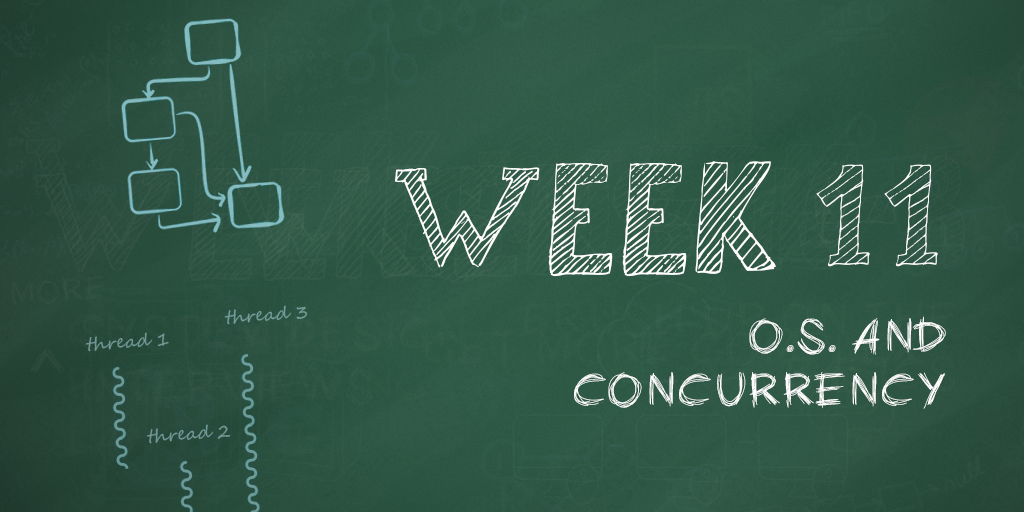
Today, even "budget" laptops and mobile phone have multiple cores. Understanding concepts similar Threads, Locks, Synchronization, etc. are beneficial whether yous are edifice a mobile app or a web-scale service.
Only like Organisation Design interview questions — Multi-Threading and Concurrency Interview questions are useful in gauging your level. A junior engineer will struggle with these questions (and are expected to larn more than on the job). A relatively senior engineer is supposed to do better in such questions as they would be responsible for writing a lot of lawmaking that takes advantage of multiple cores/threads.
C.H. Afzal'southward "Multithreading and Concurrency for Senior Applied science Interviews" series is an important one to check out, and available in multiple programming languages.
Week 12 — Object-Oriented Design Interviews:
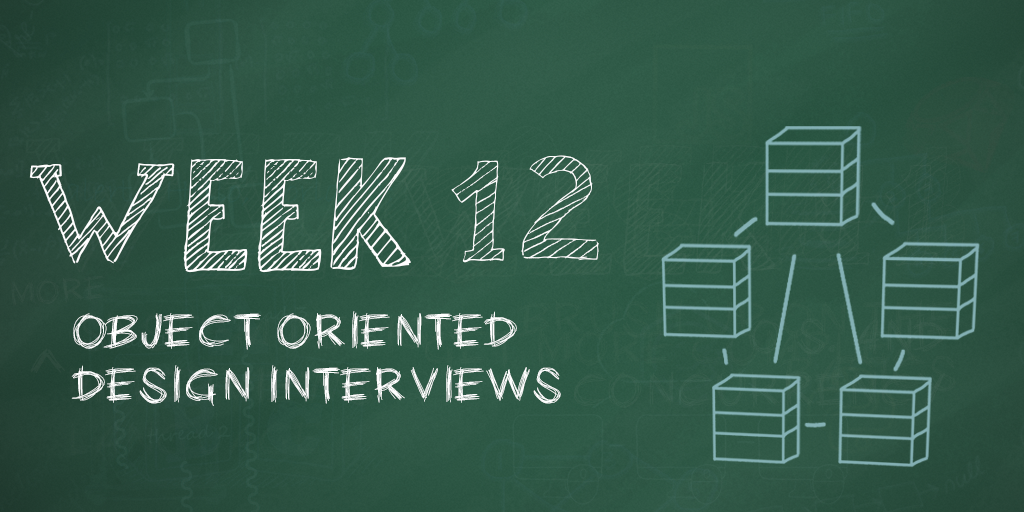
Some mutual questions include:
- Design an ATM
- Pattern an elevator
- Design a Parking System
For more than Object Oriented Pattern interview questions, check out this article: The Acme 10 Object-Oriented Pattern Interview Questions for Developers.
In Object Oriented Blueprint Questions, interviewers are looking for your agreement of Software Design Patterns and your ability to transform the requirements into comprehensible Classes. You lot spend most of your time explaining the various components, their interfaces and how different components interact with each other using the interfaces.
Take a look at Grokking the Object-Oriented Design Interview to learn more about questions that are typically asked during OOD interviews.
For learning more near some best practices for object-oriented programming with regards to software design patterns, wait at Software Design Patterns: All-time Practices for Software Developers.
Cultural fit interviews
This is the one that many think won't matter, although this is the interview that sometimes matters the most. For instance, at Amazon, culture is deeply rooted in their hiring process, where a "Bar Raiser" (someone who lives and breathes Amazon culture) can accept the final say over you getting hired.
The thinking for that is quite unproblematic: if you lot have the right attitude, yous can learn new skills and then small shortcomings in your coding or arrangement design interviews can be overlooked. Nonetheless, if a person seems to be dispassionate about the product or doesn't expect like a squad player, they are probably worth hiring even if they are great hackers.
There'southward too a famous book called The No Asshole Rule. Companies attempt not to hire people who tin be toxic — the long-term toll of doing so can exist enormous. Companies too don't want to hire engineers who are not passionate about the product. Cultural fit interviews are in that location to weed out such people.
Some of the basic rules of Cultural fit interviews are:
1. Show interest in the product, and demonstrate an understanding of it. (I once had a candidate who told me that Facebook sells cloud services like AWS (Storage/Compute). He had even used 1 of those. Now, Facebook did buy Parse.com and kept information technology live for a while, but Cloud Infrastructure was never Facebook'southward primary/core business).
ii. Be ready to describe scenarios where you had a disharmonize with your teammates or managers and how you lot resolved information technology. Delight don't say that you never had a conflict if y'all've been working every bit a software engineer for a few years.
3. Talk about what you want to accomplish in the company
4. Talk about some of your recent / nigh pregnant accomplishments as an engineer
5. Talk about some particularly crazy/hard bugs that you lot encountered.
Conclusion
Preparation for coding interviews takes a lot of time and effort, but if that helps you stand up out and show that you lot're ready for a circuitous job, it's worth information technology. I've found it helps to proceed in mind the value of the end-goal throughout — in this case, the personal satisfaction and financial compensation of landing a big-ticket software chore.
Resources
For your reference, here are a consolidated list of the resource for software-engineering interviews that I've mentioned throughout the post:
- Grokking the Coding Interview
- Algorithms and Complication Assay: An Interview Refresher
- Mastering Data Structures: An Interview Refresher
- Big O for Coding Interviews and Beyond
- Grokking the System Design Interview
- Grokking the Object-Oriented Design Interview
- Grokking Dynamic Programming for Coding Interviews
- Multithreading and Concurrency for Senior Engineering Interviews
- Software Blueprint Patterns: Best Practices for Software Developers
I'd love to know if you have any feedback. Delight reach out to me at fahim@educative.io if yous have whatever questions or feedback.
Source: https://learningdaily.dev/3-month-coding-interview-bootcamp-904422926ce8
0 Response to "The Coding Interview Bootcamp: Algorithms + Data Structures Uploaded"
Post a Comment